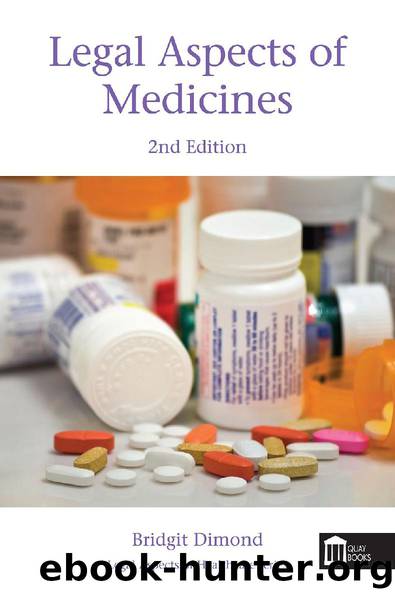Legal Aspects of Medicines by Bridgit Dimond

Author:Bridgit Dimond
Language: eng
Format: epub
Tags: Medicines/administration, Nurse prescribing, Prescriptions, British National Formulary (BNF), Patient Group Directions, Midwife prescribing, Consent and capacity, adults, children, elderly, Self administration, Accountability, Storage, destruction and management of medicines, Illegal substances, Pharmacists, Human rights, Research and medicines, Shipman, Crown Reports, Medicine and Healthcare Regulatory Agency (MHRA), Medicines Act and regulations, Misuse of Drugs Act and regulations, Drug errors
ISBN: 9781856424486
Publisher: Andrews UK Limited 2012
Published: 2012-07-06T00:00:00+00:00
References
British Medical Association (2001) Consent, Rights and Choices in Health Care for Children and Young. BMA, London.
British National Formulary (2004) Extra: News 17 August 2004; http://www.bnf.org/.
Department of Health (2009) Good practice in consent implementation guide. London
Kennedy (2001) Learning from Bristol: the report of the public inquiry into children’s heart surgery at the Bristol Royal Infirmary 1984–1995. Command paper CM 5207, Stationery Office, London.
16: Consent and the mentally disordered detained patient
Box 16.1 Compulsory treatment of a detained patient
Mavis has been detained under section 2 of the Mental Health Act 1983 for assessment. Her responsible medical officer prescribes for her an antidepressant. She refuses to take it. What is the law?
Introduction
It does not follow that because a person is mentally ill or suffers from learning disabilities that he or she is therefore incapable of making his or her own decisions. As the case of Re C shows, where a patient in Broadmoor hospital was refusing to have his leg amputated, using the criteria laid down by Judge Thorpe, he was deemed to be mentally capable and an injunction was issued that the amputation should not take place without his consent (C (re) (adult: refusal of medical treatment) [1994] 1 WLR 290). (This situation would now be covered by the Mental Capacity Act 2005) (see Chapter 14). However, there are situations where, when a patient has been detained under the Mental Health Act 1983, he or she may be compelled to have treatment, provided that certain safeguards or conditions are complied with. This chapter looks at the law on the detained patient and treatment by way of medication including the changes effected by the Mental Health Act 2007 to the Mental Health Act 1983. The Mental Health Act 2007 followed a White Paper on the Mental Health laws (DH 2000) and a draft Bill (DH 2003).
Detained patients
Under the Mental Health Act 1983 not all detained patients come under the consent to treatment provisions of Part IV of the Act. Those patients who come under the short stay detention sections such as section 4 (for up to 72 hours); section 5(2) (for up to 72 hours), section 5(4) (for up to 6 hours), and sections 135 and 136 (for up to 72 hours) are not subject to Part IV provisions and therefore cannot be given treatment compulsorily under the Act. In exceptional circumstances, they may be given treatment in their best interests under Mental Capacity Act 2005 which replaced the common law powers which were recognised in the Re F case. (F v West Berkshire HA & Another F(re) (a mental patient: sterilisation) [1989] 2 ALL ER 545 [1990] 2 AC 1.) (See Chapter 14.)
Provisions of Part IV of the Mental Health Act 1983
Patients who are detained under the longer term sections (section 2 (up to 28 days); section 3 (up to six months initially, but can be renewed), section 37 (up to six months but can be renewed)) come under the provisions of Part IV, see Box 16.2.
Box 16.2 Provisions under Part IV
Download
This site does not store any files on its server. We only index and link to content provided by other sites. Please contact the content providers to delete copyright contents if any and email us, we'll remove relevant links or contents immediately.
The Vaccine Court by Rohde Wayne(1186)
Inside the Criminal Mind by Stanton Samenow(996)
Lecretia's Choice by Matt Vickers(958)
Babies of Technology by Mary Ann Mason(921)
Deaths of Despair and the Future of Capitalism by Anne Case(855)
Five Last Acts by Chris Docker(852)
America's Bitter Pill: Money, Politics, Backroom Deals, and the Fight to Fix Our Broken Healthcare System by Steven Brill(850)
America's Bitter Pill by Steven Brill(804)
Memoir of a Race Traitor by Mab Segrest(663)
The Collected Tales by Nikolai Gogol(660)
Medical Law: A Very Short Introduction (Very Short Introductions) by Charles Foster(658)
Mental Illness, Human Rights and the Law by Brendan D Kelly(652)
Introduction to Health Care Management by Sharon B. Buchbinder Nancy H. Shanks(648)
Genomic Messages: How the Evolving Science of Genetics Affects Our Health, Families, and Future by George Annas & Sherman Elias(628)
Genomic Messages by George Annas(605)
A New Leaf by Alyson Martin Nushin Rashidian(595)
Pediatric Forensic Evidence by David L. Robinson(594)
Marijuana Law in a Nutshell by Mark Osbeck & Howard Bromberg(587)
In Reckless Hands by Victoria F. Nourse(566)
